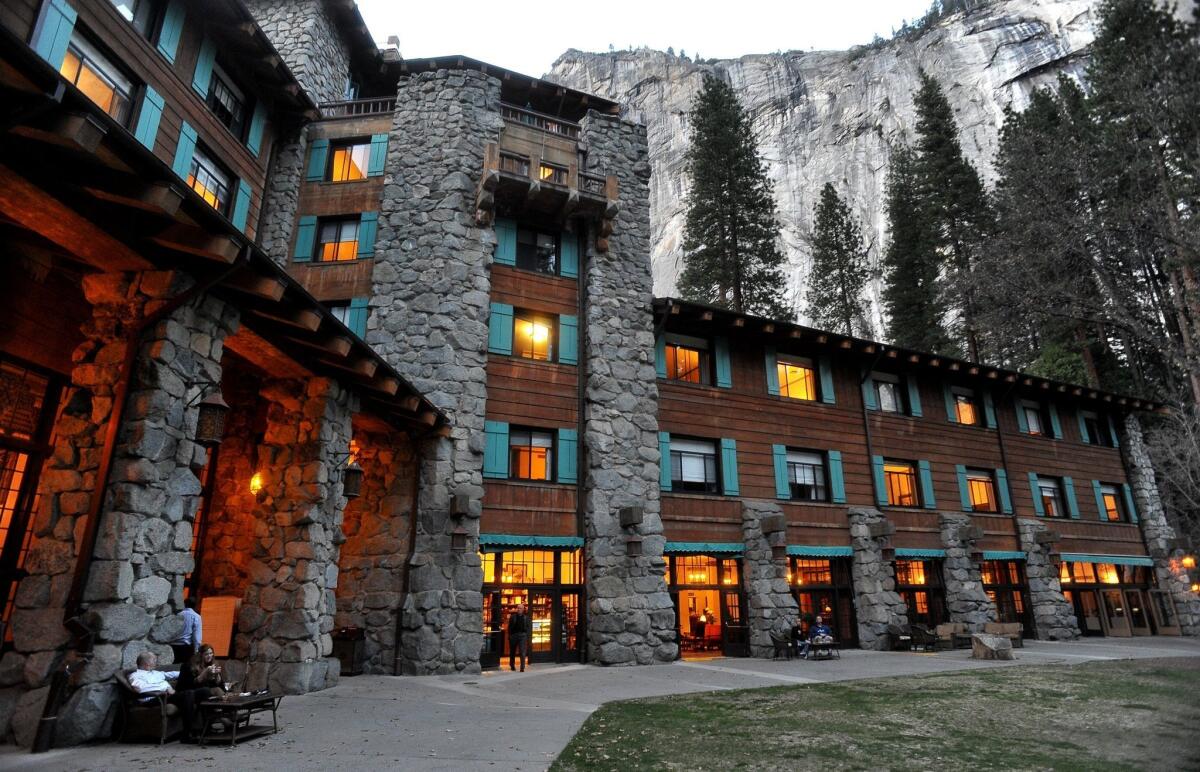Editorial: Trademark grab in Yosemite is too clever by half

The historic Ahwahnee Hotel is lit up as dusk falls over Yosemite National Park on March 24, 2014. The names of iconic hotels and other facilities in the park will soon change in an ongoing battle over who owns the intellectual property.
- Share via
For the generations of families and adventurers who’ve been camping, hiking and skiing in Yosemite National Park, Thursday’s announcement was mind-boggling: The National Park Service is changing the names of five famed park attractions, some of them more than a century old, that have drawn millions of visitors. They include Curry Village, an enclave of cabins established by one of the park’s earliest concessions operators, and the evocatively named Ahwahnee and Wawona hotels, two historic landmarks that date back to 1927 and 1879, respectively.
Even more mind-boggling is the reason for the change: a dispute over the trademarks covering the attractions’ names. It turns out that even though the National Park Service owns the hotels, cabins and ski slopes at issue, it has managed to allow someone else to own the trademarks associated with them.
The roots of the problem lie in the history of the national parks.
The roots of the problem lie in the history of the national parks. For decades, the federal government allowed entrepreneurs to build, own and operate the parks’ tourist attractions, which is how Curry Village, The Ahwahnee, Wawona Hotel, Yosemite Lodge and Badger Pass Ski Area all came into existence. Those owners often trademarked the names and logos they created. After Japanese industrial giant Matsushita bought Yosemite’s concessions in 1990, however, the Park Service gradually took ownership of the privately built improvements in all the national parks. Nevertheless, many of the trademarks remained in private hands.
The problem now is that the concessions operator at Yosemite — Delaware North, whose contract was not renewed — is demanding $44 million for the Yosemite-related trademarks, including a number it obtained without alerting the Park Service. It even trademarked the phrase “Yosemite National Park” for use on T-shirts, pens and mugs, making one wonder why a private company should have exclusive rights over the name of a national treasure. Shortly after losing its bid to continue operating Yosemite’s concessions, Delaware North sued the government for not requiring Aramark, the winning bidder, to pay more for the trademarks.
See the most-read stories this hour >>
The Park Service insists the trademarks are worth less than $2 million. But rather than risk an injunction that could interrupt service at Yosemite, it announced Thursday that it would change the names of the five attractions to more generic ones — the Ahwahnee, for instance, is to become the Majestic Yosemite Hotel. (Delaware North says the government ignored its offer to let Aramark use the trademarked names while the case is in the courts.)
Although the name change may increase the government’s leverage by slashing the value of the disputed marks, it certainly won’t help the businesses that have already printed guides and souvenirs, nor mollify angry visitors caught in a commercial war over the landmarks they love. But the National Park Service sees it as only a temporary adjustment, and hopes to restore the original names once the lawsuit is resolved.
Join the conversation on Facebook >>
The principle here is clear. Trademarks over the names and other intrinsic features of iconic destinations such as The Ahwahnee should benefit the owners of those destinations — the taxpayers. Ideally, the government would own these marks, and it could license them to concessions operators for the duration of their contracts. That’s the direction the Park Service is heading in its new contract with Aramark, but sadly not the path the government followed in its dealings with Delaware North.
Follow the Opinion section on Twitter @latimesopinion and Facebook.
ALSO
A better charter-school initiative
Another year, another Oscar whiteout
After arrest of a Palestinian journalist, a crucial voice is silenced in Gaza
More to Read
A cure for the common opinion
Get thought-provoking perspectives with our weekly newsletter.
You may occasionally receive promotional content from the Los Angeles Times.






